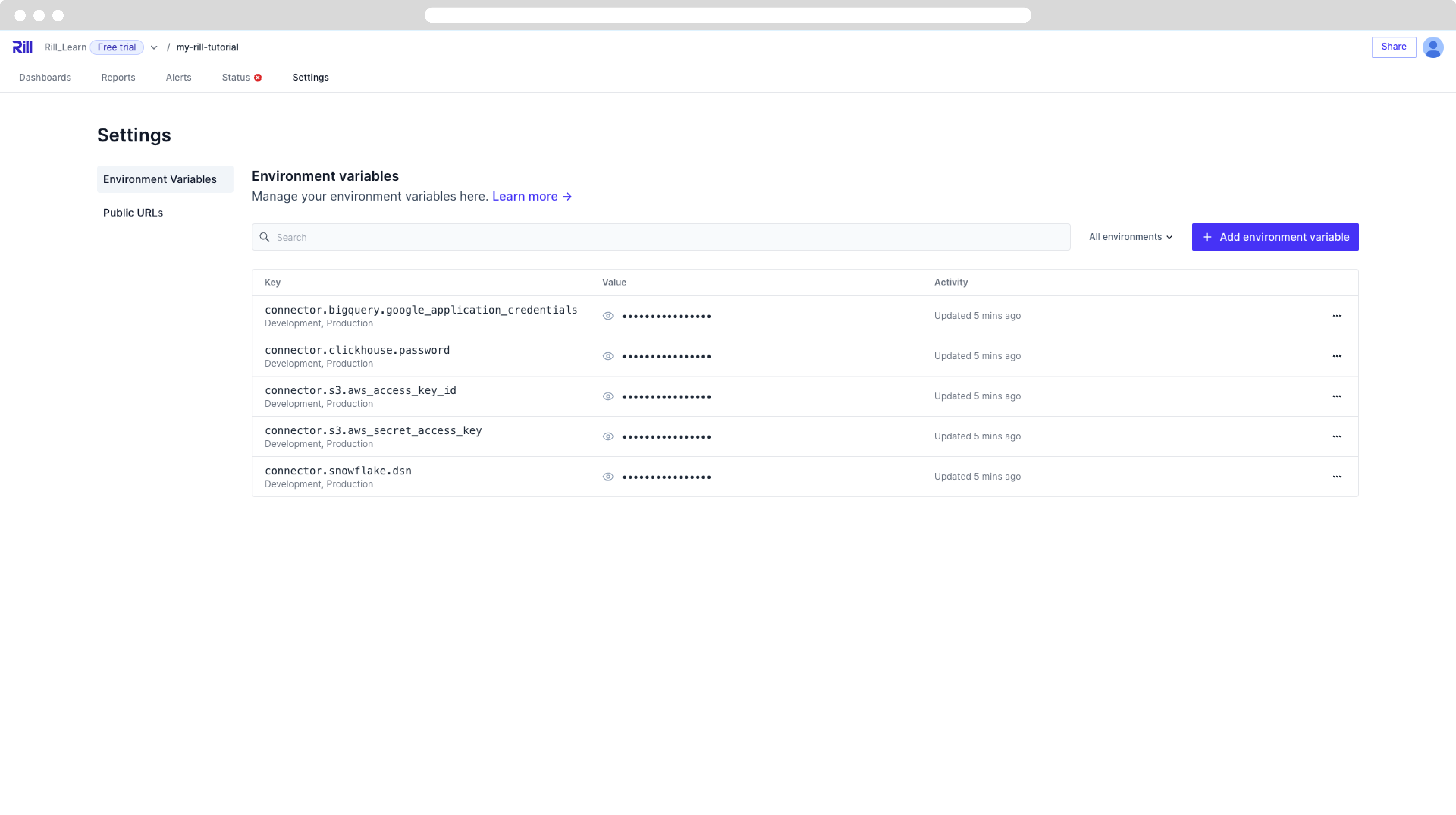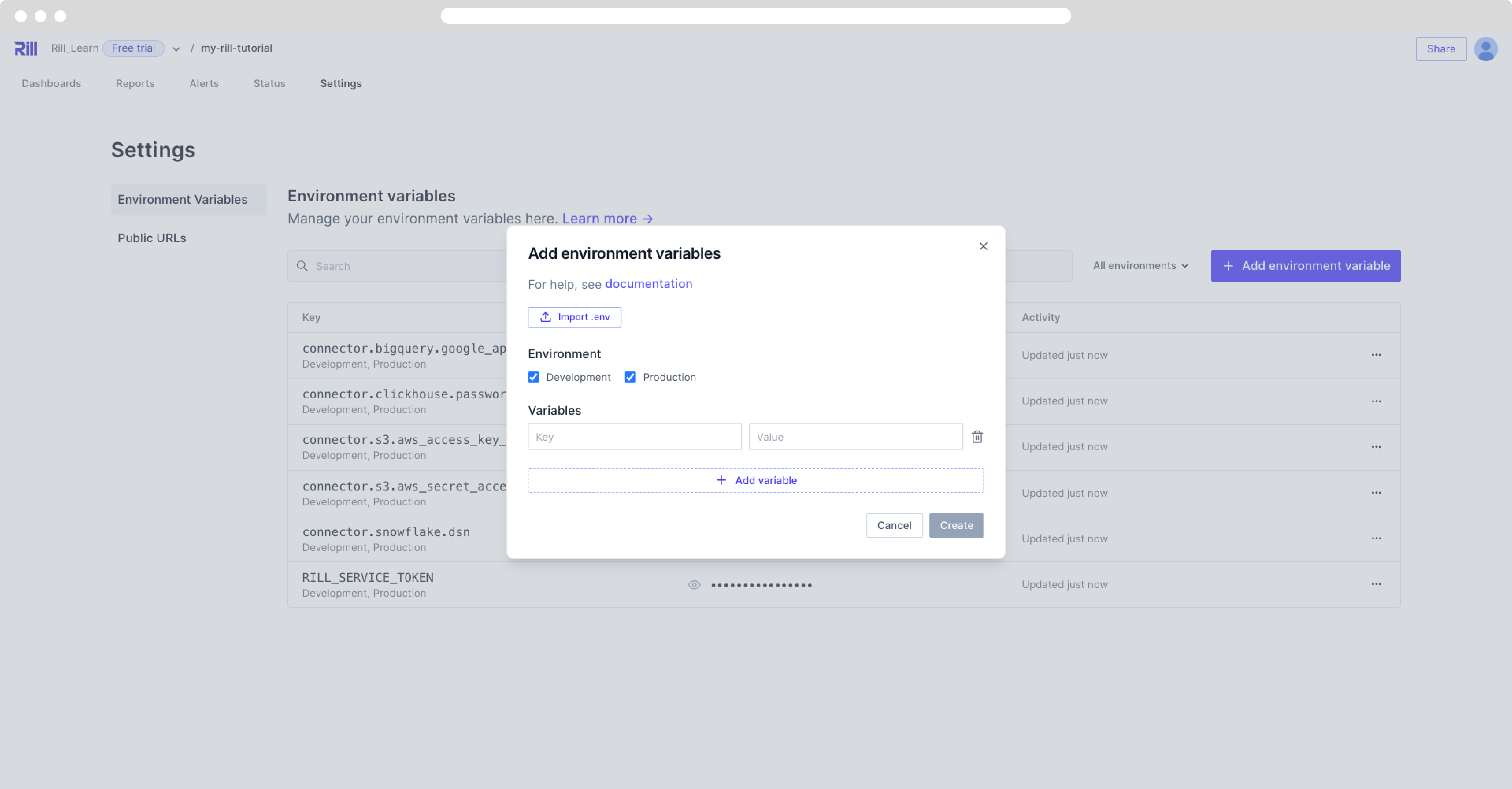Environmental Variables and Credentials in Rill Cloud
The credentials in a deployed Rill Cloud projects can be managed on the Settings page or via the CLI. If you have yet to deploy your credentials, please follow the steps in our deploy credentials page.
Modifying Variables and Credentials via the Settings Page

Adding / Editing Environmental Variables

By default, the hidden files will not be visible in the finder window. In order to view hidden files, you will need to enable "show hidden files".
Keyboard shortcut: Command + Shift + .
Pushing and pulling credentials to / from Rill Cloud via the CLI
If you have a project deployed to Rill Cloud, Rill provides the ability to sync the credentials between your local instance of Rill Developer and Rill cloud. This provides the ability to quickly reuse existing credentials, if configured, instead of having to manually input credentials each time. This can be accomplished by leveraging the rill env push and rill env pull CLI commands respectively.
It's never a good idea to commit sensitive information to Git and goes against security best practices. Similar to credentials, if there are sensitive variables that you don't want to commit publicly to your rill.yaml configuration file (and thus potentially accessible by others), it's recommended to set them in your .env file directly and/or use rill env set via the CLI (and then optionally push / pull them as necessary).
rill env push
As a project admin, you can either use rill env configure after deploying a project or rill env push to specify a particular set of credentials that your Rill Cloud project will use. If choosing the latter, you can update your <RILL_PROJECT_HOME>/.env file with the appropriate variables and credentials that are required. Alternatively, if this file has already been updated, you can run rill env push from your project's root directory.
- Rill Cloud will use the specified credentials and variables in this
.envfile for the deployed project. - Other users will also be able to use
rill env pullto retrieve these defined credentials for local use (with Rill Developer).
If a credential and/or variable has already been configured in Rill Cloud, Rill will warn you about overriding if you attempt to push a new value in your .env file. This is because overriding credentials can impact your deployed project and/or other users (if they pull these credentials locally).
rill env pull
For projects that have been deployed to Rill Cloud, an added benefit of our Rill Developer-Cloud architecture is that credentials that have been configured can be pulled locally for easier reuse (instead of having to manually reconfigure these credentials in Rill Developer). To do this, you can run rill env pull from your project's root directory to retrieve the latest credentials (after cloning the project's git repository to your local environment).
rill env pull
Updated .env file with cloud credentials from project "<Project_Name>".
Please note when you run rill env pull, Rill will automatically override any existing credentials or variables that have been configured in your project's .env file if there is a match in the key name. This may result in unexpected behavior if you are using different credentials locally.
Credentials Naming Schema
Connector credentials are essentially a form of project variable, prefixed using the connector.<connector_name>.<property> syntax. For example, connector.druid.dsn and connector.clickhouse.dsn are both hardcoded project variables (that happen to correspond to the Druid and ClickHouse OLAP engines respectively). Please see below for each source and its required properties.
| Source Name | Property | Example |
|---|---|---|
| GCS | GOOGLE_APPLICATION_CREDENTIALS | connector.gcs.google_application_credentials |
GCS_BUCKET_NAME | connector.gcs.gcs_bucket_name | |
| AWS S3 | AWS_ACCESS_KEY_ID | connector.s3.aws_access_key_id |
AWS_SECRET_ACCESS_KEY | connector.s3.aws_secret_access_key | |
| Azure | AZURE_STORAGE_ACCOUNT | connector.azure.azure_storage_account |
AZURE_STORAGE_KEY | connector.azure.azure_storage_key | |
AZURE_CLIENT_ID | connector.azure.azure_client_id | |
AZURE_CLIENT_SECRET | connector.azure.azure_client_secret | |
AZURE_TENANT_ID | connector.azure.azure_tenant_id | |
| Big Query | GOOGLE_APPLICATION_CREDENTIALS | connector.bigquery.google_application_credentials |
| Snowflake | DSN | connector.snowflake.dsn |
| ClickHouse | HOST | connector.clickhouse.host |
PORT | connector.clickhouse.port | |
USERNAME | connector.clickhouse.username | |
PASSWORD | connector.clickhouse.password | |
SSL | connector.clickhouse.ssl | |
DATABASE | connector.clickhouse.database | |
| ... |